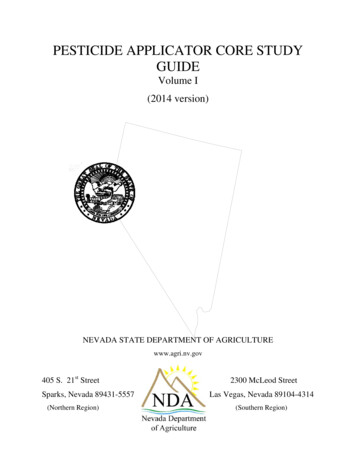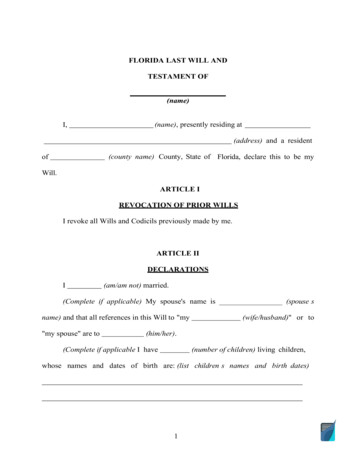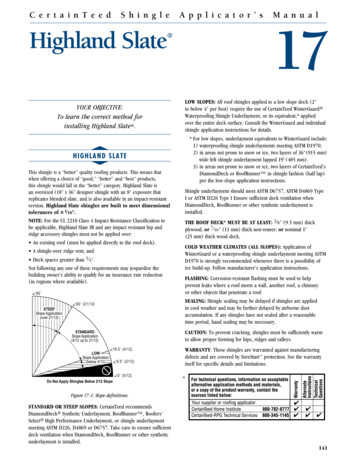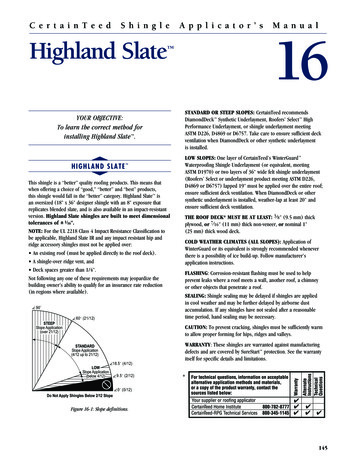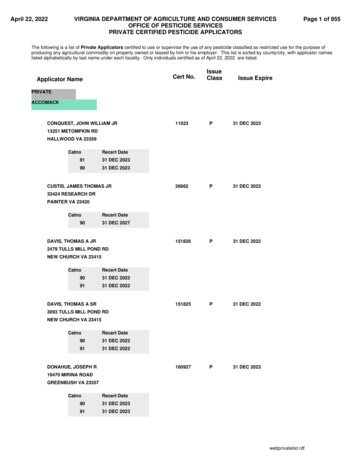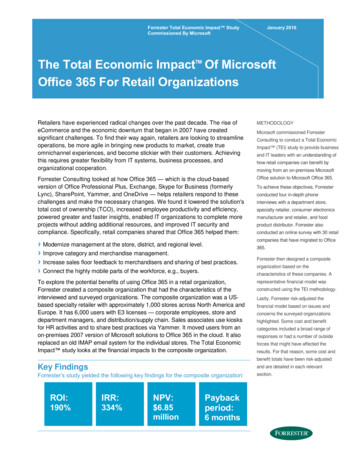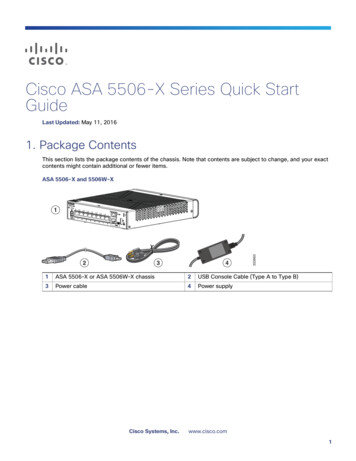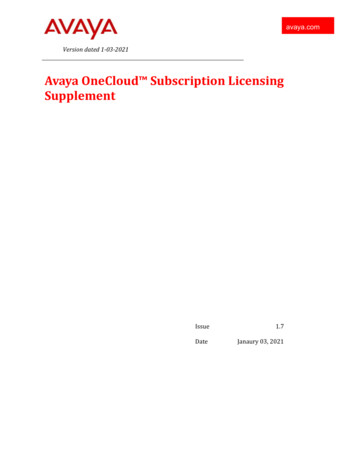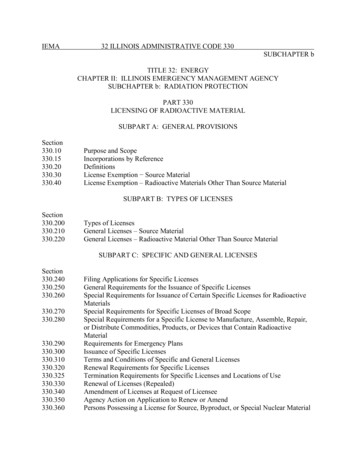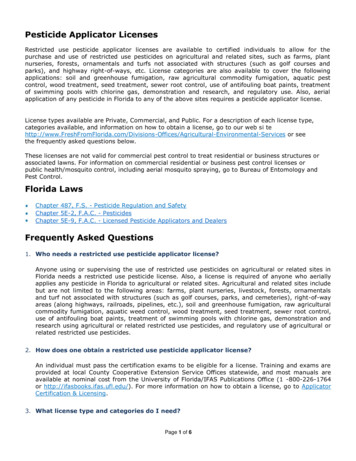
Transcription
Pesticide Applicator LicensesRestricted use pesticide applicator licenses are available to certified individuals to allow for thepurchase and use of restricted use pesticides on agricultural and related sites, such as farms, plantnurseries, forests, ornamentals and turfs not associated with structures (such as golf courses andparks), and highway right-of-ways, etc. License categories are also available to cover the followingapplications: soil and greenhouse fumigation, raw agricultural commodity fumigation, aquatic pestcontrol, wood treatment, seed treatment, sewer root control, use of antifouling boat paints, treatmentof swimming pools with chlorine gas, demonstration and research, and regulatory use. Also, aerialapplication of any pesticide in Florida to any of the above sites requires a pesticide applicator license.License types available are Private, Commercial, and Public. For a description of each license type,categories available, and information on how to obtain a license, go to our web si s/Agricultural-Environmental-Services or seethe frequently asked questions below.These licenses are not valid for commercial pest control to treat residential or business structures orassociated lawns. For information on commercial residential or business pest control licenses orpublic health/mosquito control, including aerial mosquito spraying, go to Bureau of Entomology andPest Control.Florida LawsChapter 487, F.S. - Pesticide Regulation and SafetyChapter 5E-2, F.A.C. - PesticidesChapter 5E-9, F.A.C. - Licensed Pesticide Applicators and DealersFrequently Asked Questions1. Who needs a restricted use pesticide applicator license?Anyone using or supervising the use of restricted use pesticides on agricultural or related sites inFlorida needs a restricted use pesticide license. Also, a license is required of anyone who aeriallyapplies any pesticide in Florida to agricultural or related sites. Agricultural and related sites includebut are not limited to the following areas: farms, plant nurseries, livestock, forests, ornamentalsand turf not associated with structures (such as golf courses, parks, and cemeteries), right-of-wayareas (along highways, railroads, pipelines, etc.), soil and greenhouse fumigation, raw agriculturalcommodity fumigation, aquatic weed control, wood treatment, seed treatment, sewer root control,use of antifouling boat paints, treatment of swimming pools with chlorine gas, demonstration andresearch using agricultural or related restricted use pesticides, and regulatory use of agricultural orrelated restricted use pesticides.2. How does one obtain a restricted use pesticide applicator license?An individual must pass the certification exams to be eligible for a license. Training and exams areprovided at local County Cooperative Extension Service Offices statewide, and most manuals areavailable at nominal cost from the University of Florida/IFAS Publications Office (1 -800-226-1764or http://ifasbooks.ifas.ufl.edu/). For more information on how to obtain a license, go to ApplicatorCertification & Licensing.3. What license type and categories do I need?Page 1 of 6
The license type and categories needed depend on how and where pesticides will be used . Ingeneral, a private license is valid for using restricted use pesticides to produce agriculturalcommodities on the pesticide applicator's own land or place of agricultural employment, such asapplication to a citrus grove or in a plant nursery. A public license is valid for restricted usepesticides used at a place of employment for a government entity, such as treating highway rightof- ways as an employee of the Department of Transportation. A commercial license is required forall other applications of restricted use pesticides not covered by the private or public license. Thisincludes all contract (for hire) applications made to property not owned or rented by the applicatoror his/her employer, and for all non-government applications not for the purpose of agriculturalproduction. For examples, see question #6.4. What is the definition of a "private applicator"?A "private applicator" is an individual who has reached the age of majority (generally 18 years old)and is licensed by the Department to use or supervise the use of any restricted use pesticide forpurposes of producing any agricultural commodity on property owned or rented by thelicensed person or that person's employer. A private license may also be used to apply restricteduse pesticides without compensation, other than the trading of personal services between producersof agricultural commodities, on the property of another individual for the purpose of agriculturalproduction. This license is for farm, ranch, grove, nursery, sod farm applications, etc. Application ofrestricted use pesticides for production of ornamentals and turf at a nursery or sod farm or in agreenhouse may also be performed with a private license. However, application of restricted usepesticides solely to maintain turf and ornamentals at places such as golf courses requires acommercial license.5. What is the definition of a "public applicator"?A "public applicator" is an individual who has reached the age of majority (generally 18 years ofage) and is licensed by the Department to use or supervise the use of any restricted use pesticideas an employee of a state agency, municipal corporation, or other government agency.6. What is the definition of a "commercial applicator"?A "commercial applicator" is an individual who has reached the age of majority (generally 18 yearsof age) and is licensed by the Department to use or supervise the use of any restricted usepesticide for any purpose on any property other than as provided by the definitions of "privateapplicator" and "public applicator." A commercial license is required for all contract (for hire)applications made to property not owned or rented by the applicator or his/her employer, and for allapplications not for the purpose of agricultural production. Examples: maintenance of turf andornamentals on golf courses, parks, and cemeteries (no agricultural production involved); highwayright-of-way applications; aquatic applications to keep recreational waters free of aquatic weeds;wood treatment not associated with agricultural production; etc.7. Can one license type substitute for another?A commercial license with the appropriate agricultural categories may substitute for a privatelicense if desired. A commercial license with the appropriate work-related categories may substitutefor a public license if acceptable to the government agency with which the applicator is employed,but liability issues should be considered before making any license substitutions.8. Which exams are required to obtain a private license?Page 2 of 6
Two exams are required to obtain a private applicator license: the general standards (core)exam and the private applicator agricultural pest control exam.9. Which exams are required to obtain a public license?Public applicators must pass the general standards (core) exam plus all category exams needed tocover the work in which restricted use pesticides will be used in employment with a governmentagency. At least one primary category exam is required, and there is no limit to the number ofcategory exams that may be taken. The primary category exams available to public applicators are:aerial application, agricultural animal pest control, agricultural row crop pest control, agriculturaltree crop pest control, aquatic pest control, chlorine gas infusion, forestry pest control, naturalareas weed management, organotin antifouling paint pest control, ornamental and turf pest control,raw agricultural commodity fumigation, regulatory inspection and sampling, regulatory pest control,right-of-way pest control, seed treatment, sewer root control, soil and greenhouse fumigation, andwood treatment. Public applicators must also become licensed in demonstration and research(secondary category), in addition to one or more primary categories, if their work for a governmentagency involves demonstration or research using restricted use pesticides.10. Which exams are required to obtain a commercial license?Commercial applicators must pass the general standards (core) exam plus all category examsneeded to cover the type of work in which restricted use pesticides will be used. At least oneprimary category exam is required, and there is no limit to the number of category exams that maybe taken. The primary category exams available to commercial applicators are: aerial application,agricultural animal pest control, agricultural row crop pest control, agricultural tree crop pestcontrol, aquatic pest control, chlorine gas infusion, forestry pest control, natural areas weedmanagement, organotin antifouling paint pest control, ornamental and turf pest control, rawagricultural commodity fumigation, right-of-way pest control, seed treatment, sewer root control,soil and greenhouse fumigation, and wood treatment. Commercial applicators must also becomelicensed in demonstration and research (secondary category), in addition to one or more primarycategories, if their work involves demonstration or research using restricted use pesticides.11. Where are the exams given and what is the procedure?Most of the certification exams are administered by the Cooperative Extension Service Offices inlocal counties across the state. For a table of exams given in each county, go to Pesticide ApplicatorCertification & Licensing. To find out the exam schedule for a specific County Cooperative ExtensionService Office, contact that particular office. A map of the County Cooperative Extension Serviceoffices with links to individual web sites is available at solutionsforyourlife.ufl.edu/map/index.htmland an alphabetical list of County Cooperative Extension Service offices with contact informationand website links is available at solutionsforyourlife.ufl.edu/map/index.html. Or you may contactthe Pesticide Certification Section at (850) 617-7870 for more information.The following certification exams are not routinely offered by the Cooperative Extension ServiceOffices: regulatory pest control, regulatory inspection and sampling, chlorine gas infusion, andsewer root control. The exams for these categories are administered by the Florida Department ofAgriculture and Consumer Services on an as-needed basis. To schedule these exams, call thePesticide Certification Section at (850) 617-7870.12. What study materials or classes are available for preparing for the exams?Page 3 of 6
To prepare for the certification exams, training manuals for most categories are available fromthe University of Florida/IFAS Publications Office (1-800-226-1764 or http://ifasbooks.ifas.ufl.edu/).Training classes in general standards (core) and most categories are also provided by theCooperative Extension Service at local county offices throughout the state. Each County CooperativeExtension Service Office sets its own training schedule. To find out the training schedule for aspecific County Office, you may contact that office directly. A list of County Extension Offices isprovided at solutionsforyourlife.ufl.edu/map/index.html. Also, a list of training classes approved forContinuing Education Units (CEUs) is available using the CEU Class Search. Most of the classes areavailable to individuals who need training for initial certification as well as recertification. For moreinformation, check with the contact person listed for each class.Training manuals and training classes for the following categories are provided by the FloridaDepartment of Agriculture and Consumer Services: regulatory pest control, regulatory inspectionand sampling, chlorine gas infusion, sewer root control. The Training Manual for the Chlorine GasInfusion Category is available online at: Chlorine Gas Manual 06-95 [pdf]. To obtain trainingmanuals or to schedule training classes for these categories, contact the Pesticide CertificationSection at (850) 617-7870. Training classes for these categories are included in the CEU ClassSearch.13. What is the procedure for obtaining exam results?After the certification exams are taken, a letter with exam scores is sent by the FDACS PesticideCertification Section to each individual who tested. Online exam scores are available approximatelytwo weeks after test date by secure login using the Exam Score Search. When all the requiredexams for the license type and categories needed have been passed, a license application is mailedto the individual.14. What is the procedure for applying for a license after the exams have been passed?When the required certification exams have been passed, exam results and a license application aremailed to the individual by the Pesticide Certification Section. The license application should becompleted and returned to the address on the form with the proper license fee. The licenseapplication must be filled out completely. If it is incomplete, the application will be returned forcompletion, which will delay the issuance of the license.15. What is the duration and cost of the license?All three license types are valid for four years. The license fees for the four-year licensesare: Private 100; Commercial 250; Public 100.16. How does one renew the license when it expires?Licensees must be recertified to renew their licenses. There are two options for recertification:either take the certification exams again at renewal time, or earn continuing education units (CEUs)during the four-year license period and accumulate the required number of CEUs for recertification.For a table of the number of CEUs required for each license category, go to CEU Program).Pesticide applicators are responsible for keeping CEU Record of Attendance forms obtained at CEUtraining sessions for submission to the FDACS Pesticide Certification Section with renewalpaperwork at license renewal time. Some CEU training providers enter CEU information for theirclass attendees into the FDACS online Earned CEUs database for easy tracking and verification,Page 4 of 6
but this is an optional procedure and not all CEUs earned are contained in this database. Pesticideapplicators can conduct an Earned CEU Search by license number to find out how many of theirCEUs have been entered into this system. The FDACS Pesticide Certification Section will accept thisonline record of earned CEUs by RUP (restricted use pesticide) license holders in lieu of official CEURecord of Attendance forms for those CEUs included.17. Are licensees notified when the license is about to expire?Yes, a renewal notice is mailed to all licensees approximately 60 days before the license expires. Ifa licensee does not receive the renewal notice, a copy may be requested by calling the PesticideCertification Section at (850) 617-7870. It is important that licensees inform the Department of anyaddress change. To renew a license, the licensee must complete the renewal notice and send it backto the Pesticide Certification Section with renewal fee and copies of CEU attendance records orindication that exams will be taken again to renew. If taking exams again, the County CooperativeExtension Service Office will forward exam answer sheets to the Pesticide Certification Section forgrading and license renewal.18. How does one inform the office of a change of address?A signed, written notice must be submitted to the Pesticide Certification Section to change anyaddress on file. The notice must include the applicator's complete name, license number, and newaddress, and the notice must be signed and dated. It is the licensed applicator's responsibility tonotify the Department of any address changes so important information will not be misdelivered orreturned undeliverable. The fax number for the Pesticide Certification Section is (850) 617-7895. Achange of information form may be used but is not required.19. How does one determine when and where the CEU classes are held?A searchable database of Continuing Education Unit (CEU) classes is available using the CEU ClassSearch. The database can be searched by date range, location (Florida county, Alabama, Georgia,or other location), license category, and/or sponsoring organization to produce a list of CEU classesof interest. Training classes approved for CEUs are held throughout the year at both in-state andout-of-state locations. The majority of the classes are sponsored by the Cooperative ExtensionService and held at local County Cooperative Extension Service Office locations. Additional classesare sponsored by industry organizations, commercial training firms, pesticide manufacturingrepresentatives, and other organizations, and some online, computer based, and correspondencecourses are available. All classes approved for CEUs are listed in the searchable database.FormsPlease follow the instructions provided below when printing and completing the forms listed.1. Use the free Adobe Acrobat Reader to view or print forms. Skip this step if Adobe Reader isalready installed on your pc.2. Print forms on white 8 1/2" x 11" paper.3. Type or print the entire form in blue or black ink.4. Make check(s) payable to: FLORIDA DEPARTMENT OF AGRICULTURE AND CONSUMER SERVICES.5. Mail completed application and check to: FDACS-PESTICIDE LICENSES, Post Office Box 6710, Tallahassee,Florida 32314-6710.6. Certification exams must be passed before a license is issued.FDACS-13312 - Application for Private Pesticide Applicator LicensePage 5 of 6
FDACS-13313 - Application for Public Pesticide Applicator License FDACS13310 - Application for Commercial Pesticide Applicator LicenseRelated LinksPesticide Certification & Licensing/Bureau of Licensing and EnforcementCEU Class SearchCooperative Extension County Offices (alphabetical)Cooperative Extension County Offices (map)Exam Score SearchEarned CEU SearchContactIf you have any questions, please contact:Tamara JamesE-mail: Tamara.James@FreshFromFlorida.com3125 Conner Boulevard, Building 8Tallahassee, FL 32399-1650Phone: (850) 617-7870Fax: (850) 617-7895Page 6 of 6
Infusion Category is available online at: Chlorine Gas Manual 06-95 [pdf]. To obtain training manuals or to schedule training classes for these categories, contact the Pesticide Certification Section at (850) 617-7870. Training classes for these categories are included in the CEU Class Search. 13.
